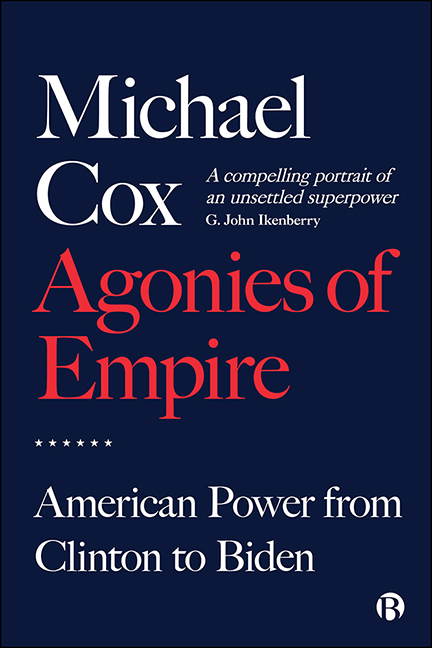Book contents
- Frontmatter
- Dedication
- Contents
- About the Author
- Preface
- Introduction: The Rise of an Empire
- PART I Clinton: Liberal Leviathan
- PART II Bush Jnr: Empire in an Age of Terror
- PART III Obama: Towards a Post-American World?
- PART IV Trump: Turbulence in the Age of Populism
- PART V Biden: Is America Back?
- Notes and References
- Acknowledgements
- Index
Introduction: The Rise of an Empire
Published online by Cambridge University Press: 15 September 2022
- Frontmatter
- Dedication
- Contents
- About the Author
- Preface
- Introduction: The Rise of an Empire
- PART I Clinton: Liberal Leviathan
- PART II Bush Jnr: Empire in an Age of Terror
- PART III Obama: Towards a Post-American World?
- PART IV Trump: Turbulence in the Age of Populism
- PART V Biden: Is America Back?
- Notes and References
- Acknowledgements
- Index
Summary
I am persuaded no constitution was ever before so well calculated as ours for extensive empire […].
The rise of the United States from being part of the first British Empire to becoming a world power by the 1890s, a superpower by the end of the Second World War, and finally the only significant player in the international system by the late 20th century, is one that has been told many times before. Viewed by critic and defender alike as one of the most extraordinary transformative events in modern world history, there is little doubting that this most ‘dangerous’ of nations, as one writer with impeccable conservative credentials once called it, would in time go on to change the world. Blessed by geography, surrounded by nothing more threatening than Mexicans, Canadians and fish, and with two vast oceans protecting it from the threat of invasion, the United States grew up in what the American international relations scholar Hans J. Morgenthau might have described as a ‘security rich’ environment. But not only was it secure from external enemies. It also benefited from an abundance of ‘free’ land (mainly stolen from Native Americans), a surfeit of capital (much of it foreign), a highly profitable system of plantation slavery producing America's most vital commodity (King Cotton), and last but by no means least, one of the largest movements of people in human history which drew nearly 30 million Europeans to American shores between 1850 and 1920. Aided and abetted by a powerful federal state, a raft of measures designed to protect the American economy from foreign competition, and a legal order that treated private enterprise and private property as sacrosanct – ‘government should not do for its people what they can best do for themselves’ declared one court in 1899 – America's rise was about as inevitable as any event in international history was likely to be, but only after it had successfully navigated the most traumatic moment in its history: the Civil War.
The history of the Civil War itself is invariably told in terms of its famous battles, its sometime less than competent generals, the huge losses suffered on both sides, and of course through the biography of the man who led the North to victory: Abraham Lincoln.
- Type
- Chapter
- Information
- Agonies of EmpireAmerican Power from Clinton to Biden, pp. 1 - 4Publisher: Bristol University PressPrint publication year: 2022



